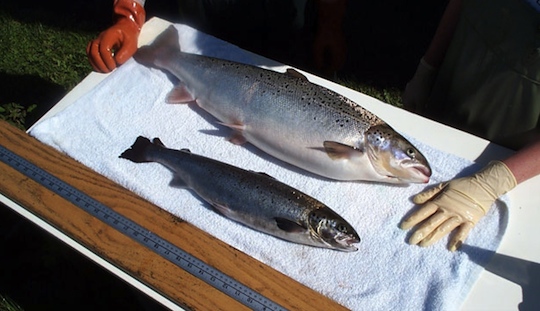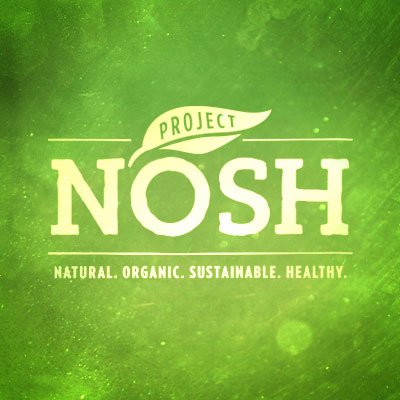
The Fight to Keep GE-Salmon Off of Our Dinner Plates is a Complicated and Uncertain One
As many of you may remember, President Obama’s Food & Drug Administration (FDA) approved the highly controversial genetically-engineered salmon in 2015, against the vocal opposition from millions of Americans, 40 members of Congress, and more than 300 environmental, consumer, health and animal welfare organizations, salmon and fishing groups and associations, food companies, chefs, and restaurants.
Yet, here we are more than two years later, and GE-salmon is still not available in the U.S., a fortunate reality but one that may not last forever.
Here is a look at this multi-faceted situation and what is preventing GE-salmon from making its way to our dinner plates.
Lawsuit Against the FDA
Soon after the FDA approved GE-salmon, the Center for Food Safety and Earthjustice filed a lawsuit against the FDA alleging, among other things, that:
(1) The FDA did not have the authority to regulate genetically-modified animals as “animal drugs” under the 1938 Federal Food, Drug and Cosmetic Act.
(2) The FDA failed to protect the environment and consult wildlife agencies in its review process, as required by federal law.
(3) The FDA violated the Endangered Species Act, of which wild salmon is an endangered species.
The lawsuit is pending, and the latest news is that a federal judge ruled that the FDA must turn over internal documents related to the GE-salmon approval process, something that the agency fought against. It is expected that the legal case will be heard sometime in the 2nd half of 2018 in the U.S. District Court for the Northern District of California.
If the FDA loses the case, the agency could appeal the decision to the U.S. 9th Circuit Court of Appeals or even possibly to the Supreme Court. So, the lawsuit could go on for a few more years, and the timing is uncertain.
The most critical piece of this case to understand is that the lawsuit against the FDA is not the reason GE-salmon is not in supermarkets today in the U.S.
There is no injunction.
Alaskan Senator Lisa Murkowski
The Republican senator from Alaska is fighting fiercely to prevent GE-salmon from entering the U.S. market, largely to protect salmon fishers in her state.
As such, she has attached two pieces of legislation to a federal omnibus bill that would require (1) GE-salmon to use the words “genetically-engineered” on its packaging and (2) the FDA to pass and implement a GE-labeling law.
She is also attempting to pass a piece of legislation that would require a third-party environmental assessment of GE-salmon.
According to Jaydee Hanson, Senior Policy Analyst at the Center for Food Safety, “Senator Murkowski won her Senate seat as a write-in candidate. She is not one to underestimate.”
FDA Protocol and Bureaucracy
The FDA still has not announced a GE-labeling law.
However, it is believed that the agency is waiting for the USDA to produce its own GE-labeling law — which Congress said must be finished by July 2018 — so that there is no overlap in between what the FDA comes out with and what the USDA comes out with.
It is uncertain if the USDA will meet its mandatory deadline of this summer.
AquaBounty’s Ability to Produce GE-Salmon
Industry observers have real doubt as to whether AquaBounty, the owner of the GE-salmon, has the ability to produce adequate amounts of product for the U.S. market, even if it were fully allowed to sell it to consumers today. Currently, AquaBounty’s GE-salmon is for sale in Canada, where it does not have to be labeled as genetically-engineered.
Dave Conley, AquaBounty’s Director of Communications, told Organic Insider in an email, “We sold 5 tons in Canada in Q2 of 2017. In our very limited commercial experience, the product has been very well received and judged to be of very high quality.”
A recent SEC filing by the company said, “We expect that sales of our fish will be infrequent and of small quantities until our Indiana and Rollo Bay (Canadian) facilities are operational and the fish in those facilities have matured, which is expected in the second half of 2019.”
Whether the relatively small amount of GE-fish produced is due to technical problems, capacity constraints, the lack of FDA approval for the Indiana facility or an inability to produce healthy fish in quantity, no one is sure.
Refusal from Major Retailers
Already, we know that major retailers such as Whole Foods, Costco, Walmart, Aldi, Trader Joe’s and 80 others have said that they will not carry GE-salmon.
That means it will probably end up in cafeterias, restaurants, schools, prisons, and food service distributors — places where GE-labeling may be exempt.
Outdated Technology
The big attraction to GE-salmon in the first place was the company’s claim that it could grow the fish to full size in half the time of regular salmon.
However, given that this technology was invented many years ago, some believe that it may have become obsolete.
Jaydee Hanson at the Center for Food Safety said, “If you’re a salmon farmer, there are lines of salmon that now grow as fast as AquaBounty. This leads to the question as to why you would want to buy eggs from AquaBounty and deal with all of the headaches.”
The Billionaire Owner
Intrexon, the owner of AquaBounty and other GE-insect and GE-apple companies, is controlled by the multi-billionaire Randal Kirk.
A venture capital arm of Randal Kirk just agreed to give Intrexon a $100M line of credit.
In Summary
There are so many variables to the GE-salmon case that it is impossible to know when it will be for sale in the U.S. market.
However, the FDA has approved GE-salmon, and even if it is delayed for several years by the courts or Congress, AquaBounty’s owner appears willing to fund this operation for as long as it takes.
This alone makes it a greater likelihood that GE-salmon is a “when” — not an “if” — scenario.
 |
Have a great day! 
Max Goldberg, Founder |
Quick Hits
* Rodale Institute has received a $6 million grant from the William Penn Foundation to partner with Stroud Water Research Center, the global leader in the advancement of knowledge and stewardship of freshwater systems, on a groundbreaking project to improve soil health and water quality.
* The project will focus on improving farm productivity and profits while reducing water pollution associated with agricultural runoff. This is great news!
* Australian airline Qantas is now offering probiotic cold-pressed juice shots and organic kombucha on some of its flights.
* On Living Maxwell, I put up two pieces that you may be interested in.
* 1) How REBBL’s new banana nut protein drink, which will be unveiled at Expo West this week, is helping the company fulfill its Not for Sale mission. REBBL’s story is pretty amazing.
* 2) How regenerative organic coffee farming in Peru may reverse deforestation.
* Again, another very inspirational story, and I’ll be doing a Facebook Live at 3:45pm PST today from Expo West with Grow Ahead, the organization behind this coffee farming program in Peru.
* To read the story and for more information about today’s Facebook Live, visit here.
* If you won’t be at Expo West and you’d like to see what is taking place from Anaheim, be sure to follow me on Instagram Stories — @livingmaxwell on Instagram.
Weekly News Summaries

General Mills to Convert 34,000 Acres to Organic
By Steve Karnowski
In a stunning move, General Mills is converting 34,000 acres -- roughly 53 square miles -- of farmland in South Dakota to organic in order to meet the supply needs of Annie's.

Organic Farmers Fear Doom if Fradulent Imports Continue
By Mikkel Pates
At the MOSES Conference in Wisconsin, industry experts and farmers fear for their livelihoods if fraudulent imported grains continue to come into the U.S.

Applegate Files Declaration Against USDA Regarding Organic Animal Welfare Standards
Applegate has filed a declaration in federal court in support of the OTA's lawsuit demanding that the USDA enact the Organic Livestock and Poultry Practices Rule. The company also donated $25,000 to the suit's legal fund.

Tension Rise Between Amazon and Whole Foods Over Coca-Cola
By Krystal Hu
Yahoo! reported that tensions have been high behind the scenes over whether to allow Coca-Cola on the shelves of Whole Foods.

As Demand for Organic Produce Grows, So Does Competition
By Hope Kirwan
While the macro picture may be very strong for organic fruits and vegetables, some farmers see increased competition as a path to lower prices.
Monarch Butterfly is at Risk of Disappearing
Data just released shows that the monarch butterfly count fell by nearly one-third from last year’s count, indicating ongoing risk of extinction for America’s most well-known butterfly. This is largely due to the widespread planting of GE-crops.

Thrive Market's VC Arm Makes First Investment
By Carol Ortenberg
Snack brand Square Organics has become the first investment for Thrive Market Ventures, the venture capital arm of Thrive Market.

Key Trends at BioFach 2018 in Germany
By Katrin Muhl, Karin Heinze and Daniela Nickel
Some of the key trends at BioFach in Germany included innovative plant-based options, coffee alternatives, and sustainable packaging.

How a Former Fashion Executive Made a Big Move into Organic Clothing
By Esha Chhabra
Working directly with farmers in India, Puja Barar launched Satva, an athleisure brand of clothing which uses organic cotton and GOTS-certified fabrics.

Biodynamic Personal Care Products are on the Rise
By Erika Stalder
Just as Biodynamic products have been gaining significant traction and interest in the organic food market, the same is starting to happen in the personal care industry.
The material in this newsletter is copyrighted and may be reprinted by permission only. All requests must be in writing. Please use our contact form to request republication rights.
Newsletter Archive
Quick Hits
* Rodale Institute has received a $6 million grant from the William Penn Foundation to partner with Stroud Water Research Center, the global leader in the advancement of knowledge and stewardship of freshwater systems, on a groundbreaking project to improve soil health and water quality.
* The project will focus on improving farm productivity and profits while reducing water pollution associated with agricultural runoff. This is great news!
* Australian airline Qantas is now offering probiotic cold-pressed juice shots and organic kombucha on some of its flights.
* On Living Maxwell, I put up two pieces that you may be interested in.
* 1) How REBBL’s new banana nut protein drink, which will be unveiled at Expo West this week, is helping the company fulfill its Not for Sale mission. REBBL’s story is pretty amazing.
* 2) How regenerative organic coffee farming in Peru may reverse deforestation.
* Again, another very inspirational story, and I’ll be doing a Facebook Live at 3:45pm PST today from Expo West with Grow Ahead, the organization behind this coffee farming program in Peru.
* To read the story and for more information about today’s Facebook Live, visit here.
* If you won’t be at Expo West and you’d like to see what is taking place from Anaheim, be sure to follow me on Instagram Stories — @livingmaxwell on Instagram.
